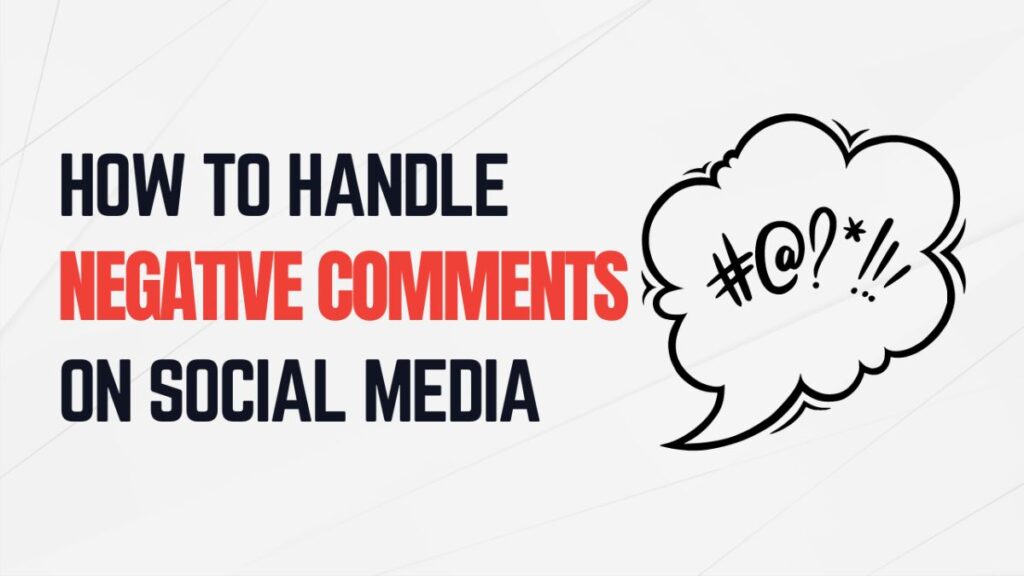Social media platforms have become integral to our daily lives, offering a space for people to connect, share, and express themselves. While these platforms provide many benefits, they also have their downsides—one of the most significant being the presence of trolls. Trolls on social media are individuals who engage in disruptive or harmful behavior, often posting negative comments, inflammatory content, or hateful speech to provoke reactions. Handling these trolls can be challenging, especially when their comments affect your mental well-being or the atmosphere of your online presence. In this article, we’ll explore how to handle negative comments and trolls on social media effectively, maintain your peace of mind, and protect your reputation.
Understanding Social Media Trolls
Before diving into strategies for dealing with trolls, it’s essential to understand what motivates them and why they behave the way they do. A social media troll is generally someone who deliberately stirs up trouble by posting inflammatory comments, making personal attacks, or engaging in behavior designed to elicit a strong emotional response from others. Trolls often thrive on chaos, using offensive language or controversial topics to provoke outrage, confusion, or conflict.
There are different types of trolls, ranging from those who seek attention to others who are just looking to disrupt conversations for the sake of it. Some trolls may even hide behind fake profiles or anonymous accounts to avoid accountability. Understanding that trolls thrive on attention can be an essential first step in deciding how to handle them.
The Impact of Negative Comments and Trolls
Trolls and negative comments can have a profound impact, especially on individuals or brands that rely on social media for communication. For businesses, trolls can damage a brand’s reputation, drive away customers, and create a toxic environment. For individuals, particularly influencers, public figures, or regular users sharing personal stories, the psychological toll can be significant. Constant exposure to negativity and criticism can lead to stress, anxiety, or even depression.
It’s crucial to recognize that the comments left by trolls are often a reflection of their own issues or insecurities, and not an accurate representation of you or your worth. Nevertheless, the emotional effects can be difficult to ignore, making it important to develop strategies for coping with negative comments and trolls.
Strategies for Handling Negative Comments and Trolls on Social Media
1. Don’t Take It Personally
The first and most important step in handling trolls on social media is to avoid taking their comments personally. Trolls often target individuals to provoke an emotional response, and if you react with anger or frustration, you may unintentionally give them the attention they crave. Remind yourself that trolls often post negative comments out of boredom, jealousy, or a need to feel powerful. Their goal is to drag you into a conflict.
By not taking the comments personally, you maintain control of the situation. Refraining from responding emotionally helps to diffuse the power of the troll’s comment, and you can proceed with a level-headed approach.
2. Use Humor to Deflect
Sometimes, humor can be an excellent way to defuse a troll’s comments and disarm their intentions. Responding with wit or a lighthearted remark can showcase your confidence and ability to brush off negativity. Humor has the added benefit of making you seem unbothered by the troll’s attempts to provoke you, and in some cases, it may even turn the situation into an opportunity to engage positively with your audience.
However, be careful not to cross the line into sarcasm that might escalate the situation or make others feel uncomfortable. A well-placed, playful response can work wonders, but it’s essential to ensure that it doesn’t add fuel to the fire.
3. Report and Block
Most social media platforms provide tools that allow users to report inappropriate or abusive behavior. If a troll’s comment crosses the line into harassment, hate speech, or threats, it’s crucial to report it immediately. Reporting helps to flag harmful behavior for moderation teams, and it may result in the troll’s account being suspended or removed.
Additionally, blocking a troll is a powerful way to take control of the situation. By blocking the individual, you prevent them from interacting with you, ensuring that they can no longer post negative comments on your content. Blocking also prevents the troll from seeing your posts, reducing the likelihood of further engagement.
While blocking and reporting can be effective tools, it’s essential to use them thoughtfully and only when necessary. If a comment is merely a harmless but annoying remark, it might be best to ignore it rather than escalate the situation.
4. Don’t Engage in Arguments
One of the most common mistakes people make when dealing with trolls is engaging in long, drawn-out arguments. Trolls typically aim to get a rise out of you, and when you engage with them, you’re giving them the very attention they seek. Engaging in an argument can also cause the situation to spiral out of control, as trolls thrive on the drama and chaos they create.
Instead of replying to a troll’s comment, try taking a step back. Recognize that engaging with someone who is only looking to upset you is rarely productive. If a comment is truly harmful or offensive, it’s better to report it or block the user, rather than attempting to reason with them.
5. Control Your Privacy Settings
Social media platforms offer various privacy settings that allow you to control who can comment on your posts and who can see your content. To prevent trolls from targeting you in the first place, take advantage of these settings to create a more secure environment. You can set your profile to private, approve comments before they’re posted, or even restrict certain individuals from commenting on your posts.
By taking control of your privacy settings, you can significantly reduce the chances of trolls interacting with your content. While it’s impossible to eliminate all negative interactions, these settings help to minimize exposure to unwelcome comments.
6. Focus on Positive Engagement
Instead of focusing on the negativity, try to engage more with your supportive followers and the positive community around you. Acknowledging the people who appreciate your content or messages can help counterbalance the negativity. Share positive feedback, respond to encouraging comments, and foster a supportive environment that highlights the good rather than the bad.
Focusing on positive engagement not only helps protect your mental health but also reinforces the type of community you want to build on your social media platforms. This positive energy can create a buffer against trolls and diminish their impact over time.
7. Consider Professional Help
If you’re dealing with sustained harassment or threats from trolls, it may be worth seeking professional help. Whether it’s legal advice to address defamatory comments or a social media expert to assist in reputation management, professional guidance can provide valuable support in handling the situation effectively. In extreme cases, you might need to involve law enforcement, especially if the comments veer into threats or stalking.
Conclusion: Protecting Your Peace of Mind
Dealing with trolls on social media can be a frustrating and emotionally draining experience. However, by adopting the right strategies, you can protect your mental health and maintain control of your online space. Remember that trolls thrive on attention, so it’s essential to approach the situation with calmness, humor, and a clear strategy. Report, block, and avoid engaging in arguments, while focusing on the positive interactions that bring value to your online experience. Social media can be a platform for connection, creativity, and growth, and by handling negative comments effectively, you can ensure that trolls don’t take away from that experience.



